Mickela Mallozzi, the New York-based host and executive producer of PBS travel series Bare Feet with Mickela Mallozzi, chats to Meg Walker about the importance of supporting the arts and why she’ll never run out of reasons to revisit Ireland.
It was 15 years ago that Mickela Mallozzi came up with the concept for her award-winning travel series, where her passion for music, dance and travel would take her all over the world, meeting diverse communities to learn about their cultures, hear their stories and dance together.
I’m catching Mickela while on yet another busy trip to Ireland, this time in the West, a combination she says of “work and leisure”, with a stop in Galway and Dingle in Co. Kerry, to meet with collaborators to discuss the return of Bare Feet Tours, set for May 2026, where visitors get an opportunity to dance with the presenter. She’s also working on another season of her hugely popular TV series.
Season 7 of Bare Feet airs on PBS in the US in May and GoTraveler globally, with the premiere episode set along the northern part of the Wild Atlantic Way, followed by Lafayette, Louisiana, for Festivals Acadiens et Créoles. “Then we have our Accessibility in the Arts episode, featuring professional companies and arts education for people with disabilities, where we ask the question, ‘What does accessibility mean?’” It’s a topic close to Mickela’s heart. “My sister has cerebral palsy, so I grew up in the disability community.”
The last two episodes of the season are set in Northern Ireland, taking in Derry and the Giant’s Causeway before the season finale in Belfast. “We only meant to do two episodes in Ireland and Northern Ireland, but we found so many amazing stories in Belfast we thought, let’s just do a whole separate episode in Belfast.”
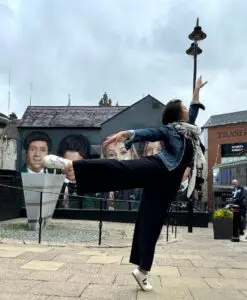
The promotional video for Seasons 7 and 8 – a total of ten episodes split into two seasons – shows a teary-eyed Mickela in different settings, leading me to wonder if this was a particularly emotional season. “I cry a lot in the show, just because I feel so connected to people. This season was especially emotional for a lot of reasons. On one occasion, I’m with the Māori people in Auckland, New Zealand, dancing the haka on the pitch of Eden Park. Sometimes I’m emotional just thinking, I can’t believe this is real. Other moments I feel overwhelmed, spiritually and emotionally. I still experience those pinch-me moments that I get to continue to connect with people, through the universal language of dance and music.”
Ireland has a its own unique vibe, she admits. “I don’t tend to get too emotional in Ireland because it’s just so much fun. Everyone’s so joyful and nobody takes themselves too seriously. I did cry once while in Belfast, talking to these two female musicians – Catriona Gribben and Miadhachlughain (Múlú) O’Donnell – who are part of an all-female trad session collective at Cultúrlann, a space where they’re keeping the Irish language alive.” Mickela goes on to explain the connections between Cultúrlann and the Irish hip hop band Kneecap, whose film (“it’s amazing,” says Mickela) has garnered massive praise the world over since its release last year, and just won a BAFTA award. Kneecap bandmember Móglaí Bap’s father, Gearóid Ó Cairealláin, who passed away in December, was an Irish language activist and founding member of Cultúrlann as well as Raidió Fáilte, which began as an Irish pirate radio station. But back to the women who made Mickela weep: “Catriona was talking about growing up not having that opportunity to learn the language, and here was this space where she could, and now it’s a safe space for her to perform with other women.”
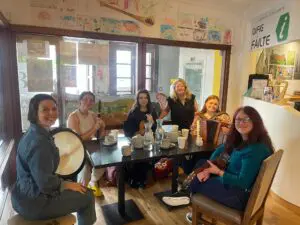
Season 8 lands in October and premieres with Cuba, followed by two episodes in New Zealand and finishing with Taiwan. “In Taiwan, we met with two indigenous communities. I don’t think people realise how many indigenous communities there are worldwide, especially in Asia. We were in Tainan, which is the oldest city in Taiwan. It was colonised by the Dutch, Japanese, then the Chinese so it has all those influences. Taiwan was really beautiful and the food’s incredible.”
Despite Ireland’s relatively small geographic size, Mickela is adamant there are countless things to keep her coming back. On this latest trip, she met dancer and co-founder of Céim Arts, Jonathan Kelliher. “He’s learned these old steps that have been passed down to him from previous generations. The dances are similar to sean-nós or Irish dancing, but it’s all about the history, the culture, and the stories are always different. I’ve been drawn to Ireland for 14 years, and I always find more stories and new places to explore. I tend to go back to places I feel connected to, and the dance and music is such an integral part of the culture here. And in Belfast, there’s so much new art coming out, and all these cool contemporary artists. Like the ‘tradtronica’ band, Huartan – their music is very pagan influenced. Or Kíla, who started singing in Irish in the ’80s, collaborating with world musicians and not just keeping to strict Irish trad music.”
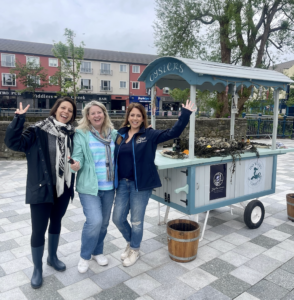
Bare Feet crew with the Sligo Oyster Experience
Mickela’s currently filming Season 9, which will highlight the Gombey Festival in Bermuda, and Bomba, plena and salsa dancing in Puerto Rico. “We also want to show New Orleans’ rich history of dance and music outside of Mardi Gras. Then we’re heading up to the indigenous community in Quebec, near Montreal.” She’s also returning to Dublin in March to once again co-host the St. Patrick’s Day parade. “I always plan to come back to Ireland – I can’t stay away,” she laughs.
When she’s looking to go off-grid and take some time away from the camera, Mickela – the daughter of two Italian immigrants – heads to southern Italy. “My family still has this little farmhouse there. It was our location for the pilot episode of Bare Feet. Nobody speaks English, and I’m related to half the town. It’s a special place. I feel connected to the earth there. I’ll walk along the beach and harvest olives from the trees my great-grandparents cultivated.”
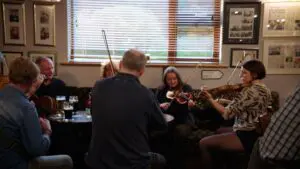
I wonder what life lessons she’s learned in all the years she’s been working on the show. “Everybody’s the same, no matter what language we speak, what religion we follow, what colour our skin. Everybody wants the same things – food, shelter, love, family, joy… The beautiful thing about dancing with people is, that comes out. You don’t have to speak the language to understand that.”
There are those lost in translation moments that crop up now and again, she asserts. “It is a unique show, no one does what we do. I’ve never done these dances before and sometimes that message is lost and we’ll show up and they think it’s a performance, but it all works out. Cuba is a beautiful place with warm, welcoming people, but there are people there who are starving. We didn’t have power for a couple of days, we ran out of gas, we couldn’t find water… There are things happening in that place that are detrimental but people still got together, celebrated and made music.”
What are some of the things she’s most proud of? “The fact that the show is still around, at the calibre it is now… I don’t think viewers understand that we’re a completely independent show. We’re funded through grants, foundations and sponsors. I don’t have to answer to the head of a network. Our Accessibility in the Arts episode – two years ago, when we started pre-production, no one would have greenlit that. And now, the timing is amazing for it to come out, because of the retraction of DEI in the US. Last season, we did an episode on this Arab-American community in Brooklyn. This was before what had happened in Palestine. Everything takes about two years, so when it came out, it was just after the first major attack. People asked, ‘Are you going to pull that episode?’ And I was like, ‘No, this is a story that needs to come out now more than ever, to show these are real people. They’re families, neighbours, they celebrate joy just like you do, and food, music and dance. I’m really proud of what we do.”
“The arts are invaluable,” she continues. “You don’t have to want to become a professional dancer or musician for the arts to help you become a better doctor, lawyer, bus driver, politician, whatever it may be – just to have a sense of empathy, a well-rounded place in your community and a way of expressing yourself. But unfortunately, in the States, the arts have always been the first thing that’s cut from budgets, and now we don’t know the future of the arts or of public media, of PBS. Things like the New York City Ballet or the Met, institutions that heavily rely on government funding could potentially disappear. It’s scary, and we’re all bracing ourselves. For now, all I can do is continue to try and get the show on air. We have teachers telling us they use the show to inspire students to learn about another culture. That’s what I am hoping to add to this landscape. We’re trying to be part of the solution.”
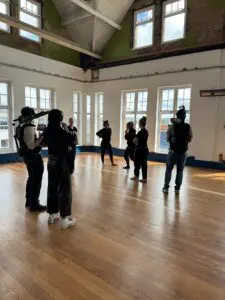
Dancing with Off the Rails crew in Belfast
Mickela’s advice to anyone travelling anywhere is simple: “Whatever you love to do back home – whether that’s dance, cooking, singing, bird watching, photography, running – do that when you’re travelling because you’ll find that community. The reason Bare Feet works is because I love to dance. When I hear music, I can’t keep my feet still. And when I meet people who are as enthusiastic as I am about dancing, there’s this connection. In Ireland, there are local theatres and dance troupes or you can just go to a pub and hear trad music. If you’re on your own, you’re going to make friends. People are so open and willing to chat. I think that’s why I fell in love with this place.”
Season 7 of Bare Feet with Mickela Mallozzi is available to stream from May 1 on the PBS app, PBS.org, Amazon Prime Video and on the GoTraveler app; travelbarefeet.com.

